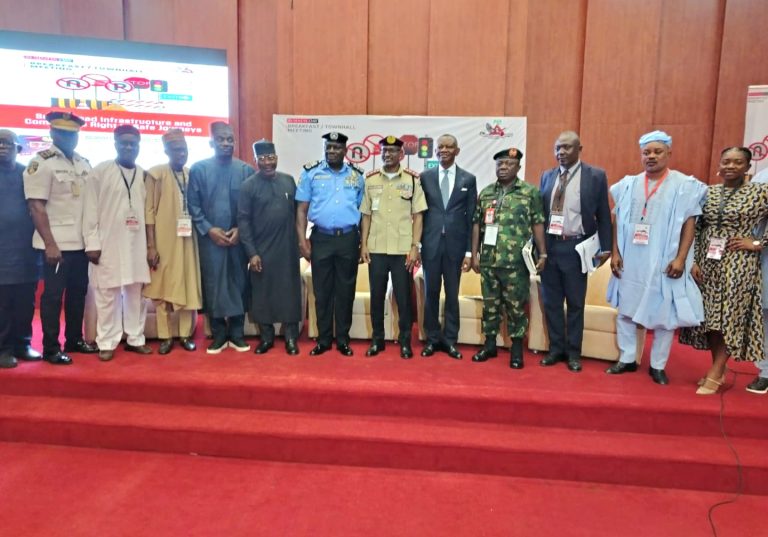By Ibironke Ariyo
The Corps Marshal, Federal Road Safety Corps (FRSC), Malam Shehu Mohammed, has emphasised the need for smart road infrastructure to improve road safety in Nigeria.
Mohammed said this in his speech at a breakfast organized by the FRSC in collaboration with Business Day newspaper in Abuja on Wednesday.
He said the aim of the meeting was to stimulate conversations on how smart road infrastructure could improve road safety in Nigeria.
The News Agency of Nigeria (NAN) reports that the theme of the event was “Smart Road Infrastructure and the Right of Travelers to Travel Safely”.
The Corps Marshal said the meeting was also part of the FRSC’s ongoing campaign, ‘Ember Month’, which aims to enable commuters to know their rights and speak out against reckless driving.
This, he said, is being done using the recently launched FRSC mobile app.
“There is no doubt that this breakfast will provide a valuable opportunity for interested parties to exchange ideas on the role of smart road infrastructure.
“This will also help reduce road accidents and address current challenges that threaten road safety,” he said.
Mohammed said road transport is the most widely used mode of transport in Nigeria, adding that smart roads can significantly reduce the number of road accidents.
He further said that security is a fundamental right, adding that it is essential to guarantee the health, peace, justice and socioeconomic well-being of the general population.
“However, this does not necessarily mean that all road users understand the implications of such a finding.
“There is no doubt that road transport is the most widely used mode of transport in Nigeria. In fact, it remains the most affordable, available, reliable and connected transportation system.
“It is also used to facilitate trade, investment and other services and is the cheapest and most accessible mode of transport, leading to overdependence on most services, especially door-to-door transactions.
“Interestingly, through the use of technology, smart roads continue to have a profound impact on the way we live and interact with our environment.
“These innovative roads go beyond traditional infrastructure and represent a leap towards a future where roads can become smart, interactive and improve our everyday lives in many ways,” he said.
Mohammed, who represented Smart Roads, also known as smart or connected roads, added that it is a futuristic vision of smart road infrastructure that integrates cutting-edge technologies to improve safety, efficiency and sustainability.
He said: “With new pressure on cities to develop more efficient roads and motorways, smart infrastructure is key to modernization.
“These devices that enable smart road technology include, but are not limited to: speed sensors, acoustic sensors, IP video surveillance cameras, smart traffic lights, electronic toll states, weather monitoring systems and digital displays.
“They help cities adapt to long-term sustainable transport needs by improving congested roads, streamlining traffic and improving services and emergency response,” he said.
Mohammed noted that Nigeria has actively responded to the United Nations Decade of Action for Road Safety (2011-2030) through initiatives such as the National Road Safety Advisory Council (NARSAC).
He added that the FRSC has also initiated impactful policies and programmes that have enabled Nigeria to be recognised as a road safety conscious country.
The Corps Marshal thanked stakeholders, including the media, for their support and called for further collaboration to make Nigeria’s roads safer, smarter and more accessible.
In his goodwill message, AIG Benneth Igweh, in charge of Zone 7, called for more synergy among other sister safety agencies.
Igweh said the police had found that one agency was unable to control or manage traffic in Nigeria, adding that traffic violations had increased in recent times.
He advocated the use of drones to reduce road accidents, saying it would help monitor accident-prone areas and other places in terms of road safety.
“I congratulate the agencies for organizing this event. The safety campaign during the hot months should also include the safety campaign because that is where the whole problem starts.
“We need to work with the National Drug Law Enforcement Agency (NDLEA) to combat alcohol consumption and drug management among motorists and in parking lots.
“It is also necessary to include the use of drones to curb road accidents because it will help them in their activities,” he said.
In his speech, Prof. Yusuf Suberu, National Coordinator, FCT Team Leader and Chairman, Federation Vehicle Inspection Office (VIO), said the use of technology would be of great help in managing road accidents in Nigeria.
Suberu said smart road infrastructure would also improve safety, efficiency and sustainability, adding that it involves real-time monitoring and management technology.
“Through smart road infrastructure, road accidents in Nigeria can be minimized,” he said.
The organization unveiled the 2024 ‘Ember Month’ awareness campaign with the theme ‘Speak out against reckless driving: more passengers than drivers die in accidents’, group photos and round tables, among others.



